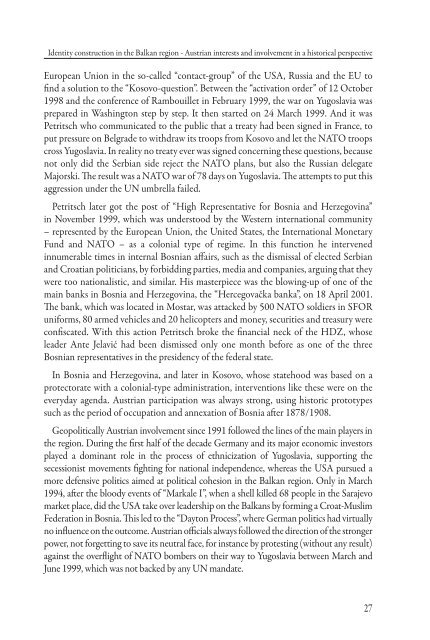Cultural Identity Politics in the (Post-)Transitional Societies
Cultural Identity Politics in the (Post-)Transitional Societies
Cultural Identity Politics in the (Post-)Transitional Societies
Create successful ePaper yourself
Turn your PDF publications into a flip-book with our unique Google optimized e-Paper software.
<strong>Identity</strong> construction <strong>in</strong> <strong>the</strong> Balkan region - Austrian <strong>in</strong>terests and <strong>in</strong>volvement <strong>in</strong> a historical perspective<br />
European Union <strong>in</strong> <strong>the</strong> so-called “contact-group” of <strong>the</strong> USA, Russia and <strong>the</strong> EU to<br />
f<strong>in</strong>d a solution to <strong>the</strong> “Kosovo-question”. Between <strong>the</strong> “activation order” of 12 October<br />
1998 and <strong>the</strong> conference of Rambouillet <strong>in</strong> February 1999, <strong>the</strong> war on Yugoslavia was<br />
prepared <strong>in</strong> Wash<strong>in</strong>gton step by step. It <strong>the</strong>n started on 24 March 1999. And it was<br />
Petritsch who communicated to <strong>the</strong> public that a treaty had been signed <strong>in</strong> France, to<br />
put pressure on Belgrade to withdraw its troops from Kosovo and let <strong>the</strong> NATO troops<br />
cross Yugoslavia. In reality no treaty ever was signed concern<strong>in</strong>g <strong>the</strong>se questions, because<br />
not only did <strong>the</strong> Serbian side reject <strong>the</strong> NATO plans, but also <strong>the</strong> Russian delegate<br />
Majorski. The result was a NATO war of 78 days on Yugoslavia. The attempts to put this<br />
aggression under <strong>the</strong> UN umbrella failed.<br />
Petritsch later got <strong>the</strong> post of “High Representative for Bosnia and Herzegov<strong>in</strong>a”<br />
<strong>in</strong> November 1999, which was understood by <strong>the</strong> Western <strong>in</strong>ternational community<br />
– represented by <strong>the</strong> European Union, <strong>the</strong> United States, <strong>the</strong> International Monetary<br />
Fund and NATO – as a colonial type of regime. In this function he <strong>in</strong>tervened<br />
<strong>in</strong>numerable times <strong>in</strong> <strong>in</strong>ternal Bosnian affairs, such as <strong>the</strong> dismissal of elected Serbian<br />
and Croatian politicians, by forbidd<strong>in</strong>g parties, media and companies, argu<strong>in</strong>g that <strong>the</strong>y<br />
were too nationalistic, and similar. His masterpiece was <strong>the</strong> blow<strong>in</strong>g-up of one of <strong>the</strong><br />
ma<strong>in</strong> banks <strong>in</strong> Bosnia and Herzegov<strong>in</strong>a, <strong>the</strong> “Hercegovačka banka”, on 18 April 2001.<br />
The bank, which was located <strong>in</strong> Mostar, was attacked by 500 NATO soldiers <strong>in</strong> SFOR<br />
uniforms, 80 armed vehicles and 20 helicopters and money, securities and treasury were<br />
confiscated. With this action Petritsch broke <strong>the</strong> f<strong>in</strong>ancial neck of <strong>the</strong> HDZ, whose<br />
leader Ante Jelavić had been dismissed only one month before as one of <strong>the</strong> three<br />
Bosnian representatives <strong>in</strong> <strong>the</strong> presidency of <strong>the</strong> federal state.<br />
In Bosnia and Herzegov<strong>in</strong>a, and later <strong>in</strong> Kosovo, whose statehood was based on a<br />
protectorate with a colonial-type adm<strong>in</strong>istration, <strong>in</strong>terventions like <strong>the</strong>se were on <strong>the</strong><br />
everyday agenda. Austrian participation was always strong, us<strong>in</strong>g historic prototypes<br />
such as <strong>the</strong> period of occupation and annexation of Bosnia after 1878/1908.<br />
Geopolitically Austrian <strong>in</strong>volvement s<strong>in</strong>ce 1991 followed <strong>the</strong> l<strong>in</strong>es of <strong>the</strong> ma<strong>in</strong> players <strong>in</strong><br />
<strong>the</strong> region. Dur<strong>in</strong>g <strong>the</strong> first half of <strong>the</strong> decade Germany and its major economic <strong>in</strong>vestors<br />
played a dom<strong>in</strong>ant role <strong>in</strong> <strong>the</strong> process of ethnicization of Yugoslavia, support<strong>in</strong>g <strong>the</strong><br />
secessionist movements fight<strong>in</strong>g for national <strong>in</strong>dependence, whereas <strong>the</strong> USA pursued a<br />
more defensive politics aimed at political cohesion <strong>in</strong> <strong>the</strong> Balkan region. Only <strong>in</strong> March<br />
1994, after <strong>the</strong> bloody events of “Markale I”, when a shell killed 68 people <strong>in</strong> <strong>the</strong> Sarajevo<br />
market place, did <strong>the</strong> USA take over leadership on <strong>the</strong> Balkans by form<strong>in</strong>g a Croat-Muslim<br />
Federation <strong>in</strong> Bosnia. This led to <strong>the</strong> “Dayton Process”, where German politics had virtually<br />
no <strong>in</strong>fluence on <strong>the</strong> outcome. Austrian officials always followed <strong>the</strong> direction of <strong>the</strong> stronger<br />
power, not forgett<strong>in</strong>g to save its neutral face, for <strong>in</strong>stance by protest<strong>in</strong>g (without any result)<br />
aga<strong>in</strong>st <strong>the</strong> overflight of NATO bombers on <strong>the</strong>ir way to Yugoslavia between March and<br />
June 1999, which was not backed by any UN mandate.<br />
27




